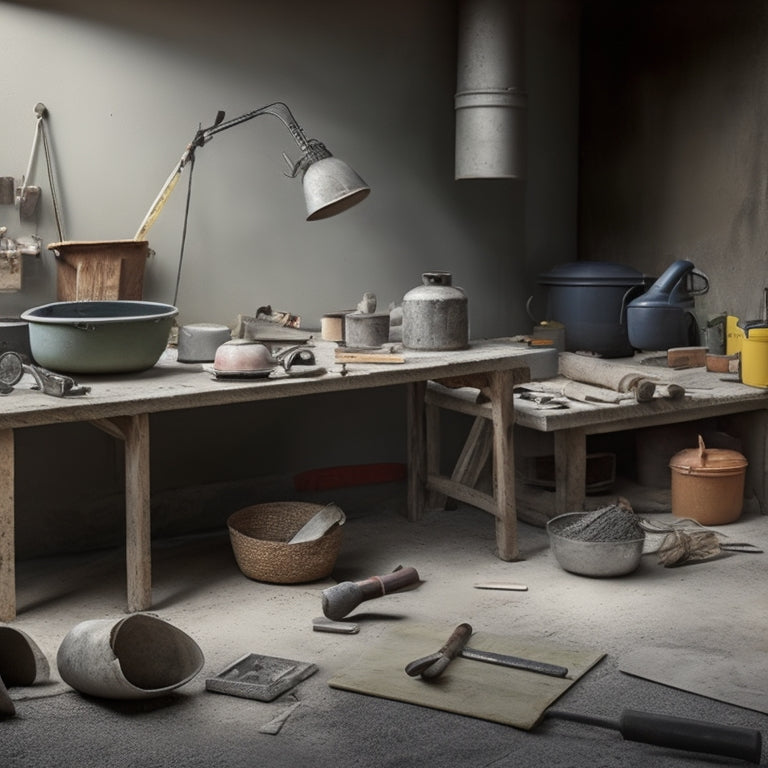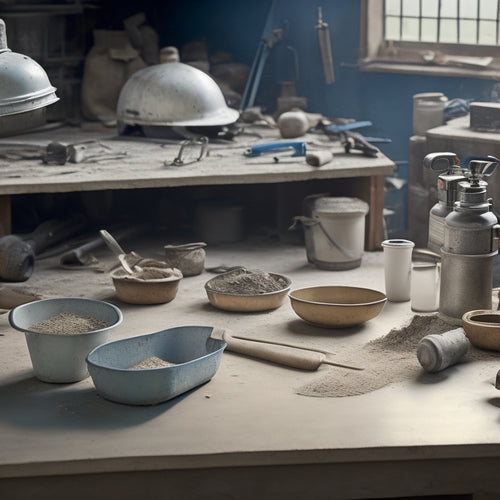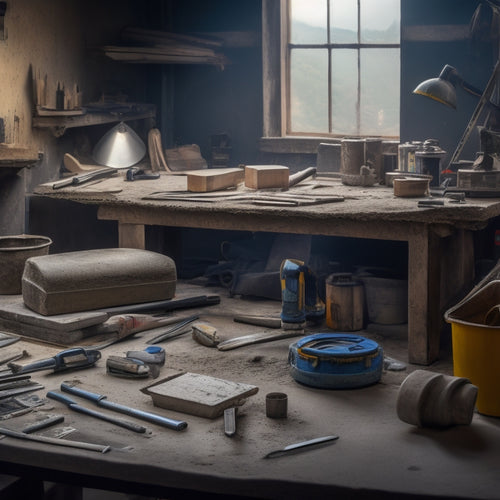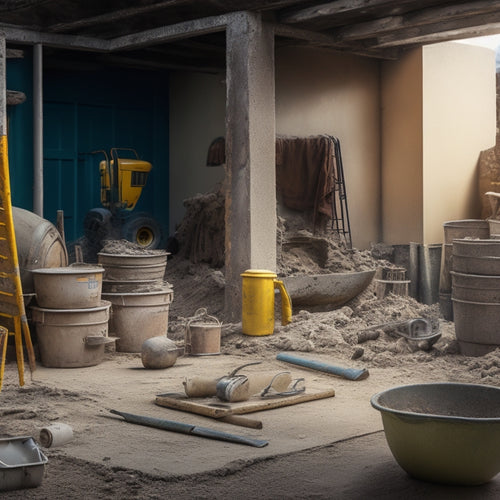
What Tools Do Concrete Finishers Really Need
Share
You need a solid arsenal of tools to deliver high-quality concrete finishes that meet project specifications and exceed client expectations. To get started, identify specific project requirements and consider concrete size, type, and desired finish to narrow down tool types. Prioritize ergonomic handles, durable materials, and suitable tools for each project stage. Don't forget to factor in tool maintenance and budget effectively for essential tools. By investing in high-quality tools and reliable manufacturer support, you'll set yourself up for success and efficiency. Now, take the next step to uncover the specific tools and strategies that'll take your concrete finishing skills to the next level.
Key Takeaways
• Identify specific project requirements to ensure appropriate tool selection for concrete finishing tasks.
• Prioritize ergonomic and durable tools, such as steel or stainless steel trowels, for efficient and long-lasting performance.
• Allocate budget effectively, prioritizing must-have tools, like bull floats and edgers, over nice-to-haves for optimal project outcomes.
• Invest in high-quality tools for consistent performance and longevity, rather than opting for cheap alternatives that may compromise results.
• Consider tool maintenance needs, including cleaning and storage requirements, to extend tool lifespan and reduce costs.
Tool Selection Process Essentials
Determine your project's specific requirements before selecting tools to guarantee you have the right equipment for the job.
You'll want to reflect on factors like the size and type of concrete you're working with, as well as the desired finish. This will help you narrow down the types of tools you need, such as trowels, edgers, and floats.
Next, think about the tool types you'll require for each stage of the project. For instance, you may need a power trowel for large, open areas, and a hand trowel for smaller, more detailed work.
Don't forget to reflect on tool maintenance, too. Will you need to clean and lubricate your tools regularly? Are there any specific storage requirements to keep them in good condition?
Manufacturer Support Expectations
As you assemble your toolkit, you'll also want to contemplate the level of support you can expect from the manufacturers of those tools. A reliable manufacturer can be a game-changer when you're in the midst of a project and need assistance.
You should expect a certain level of warranty services, including repair or replacement of defective tools, as well as technical assistance when you encounter issues.
When evaluating manufacturers, look for those that offer extensive warranty programs and dedicated customer support teams. You want to know that you can get help quickly and easily if you need it.
Additionally, consider manufacturers that provide online resources, such as tutorials and FAQs, to help you troubleshoot common issues.
Concrete Finishing Tool Features
What features should you look for in concrete finishing tools to confirm you're getting the right ones for your projects?
When selecting trowels, consider the type: steel, stainless steel, or aluminum. Each has its strengths, with steel being durable and stainless steel resistant to corrosion. Aluminum trowels are lightweight and ideal for smaller projects.
Look for ergonomic handles that fit comfortably in your hand, reducing fatigue during long hours of finishing.
When it comes to finishing techniques, think about the specific tasks you need to accomplish. Are you working on a large, flat surface or a smaller, more intricate area? Do you need to achieve a smooth, glossy finish or a textured, decorative look?
Different tools are designed for specific techniques, so make certain you have the right ones for the job. For example, a bull float is perfect for large, flat areas, while an edger is better suited for tight spaces and detailed work.
Budgeting for Essential Tools
Now that you've selected the right concrete finishing tools for your project, you'll need to take into account the budget to guarantee you have everything you need to get the job done.
It's vital to allocate your budget wisely to make certain you're investing in the most important tools. Start by identifying the must-haves and prioritize them over the nice-to-haves. Consider cost-effective solutions that can help you save money without compromising on quality.
Proper tool maintenance is also important to extending the lifespan of your tools and reducing replacement costs. Make sure to include tool maintenance tips in your budgeting plan. This can include regular cleaning, lubrication, and storage of your tools.
Additionally, consider setting aside a budget for occasional repairs or replacements. By budgeting for important tools and maintaining them properly, you'll be able to complete your project efficiently and effectively.
Prioritizing Tool Quality Over Cost
You'll get more bang for your buck by prioritizing tool quality over cost, even if it means spending a bit more upfront. Cheap tools might seem like a good deal, but they often lead to subpar results, frequent replacements, and wasted time. Instead, invest in high-quality tools that'll deliver consistent performance and last longer.
When you prioritize tool quality, you're investing in tool durability. A well-made tool can withstand the rigors of daily use, reducing the need for frequent repairs or replacements. This means you'll spend less in the long run and enjoy a smoother workflow.
Furthermore, high-quality tools are designed to provide peak performance, ensuring your concrete finishes meet the highest standards.
Frequently Asked Questions
How Often Should I Clean and Maintain My Concrete Finishing Tools?
You should clean and maintain your concrete finishing tools daily, or at least after each use.
Set a routine to guarantee cleaning frequency and tool maintenance aren't overlooked.
Remove dried concrete, wash with soap and water, and apply a rust inhibitor to metal tools.
Regularly inspect and sharpen or replace worn-out parts.
Can I Use the Same Tools for Different Types of Concrete Mixes?
You're a master of concrete finishing, juggling an endless array of mixes like a pro!
But, can you really use the same tools for different types of concrete? The answer is yes, with a caveat.
Look for tool versatility, as it's key to mix compatibility. While some tools can handle various mixes, others might not.
Be smart, and choose tools that can adapt to your mix du jour.
What Safety Gear Is Essential for Concrete Finishing Jobs?
When you're on a concrete finishing job, you're responsible for following safety regulations to protect yourself and others.
You must wear personal protective equipment (PPE) like hard hats, safety glasses, earplugs, and steel-toed boots.
Don't forget gloves, respirators, and dust masks to prevent skin and lung damage.
You control the risks by wearing the right gear, so take it seriously and stay safe on the job site.
How Do I Store My Tools to Prevent Damage and Rust?
You take pride in your tools, and rightfully so. To prevent damage and rust, you'll want to prioritize tool storage.
Start by designating a dry, protected area for your tools. Use a rust-inhibiting coating on metal tools and store them in airtight containers or bags.
For added protection, consider a dehumidifier or silica gel packets. By following these steps, you'll keep your tools in top condition, ensuring they're always ready for the next job.
Are There Any Specific Tools for Finishing Concrete in Cold Weather?
When finishing concrete in cold weather, you'll need to adapt your techniques and equipment to guarantee a smooth, even finish.
You'll want to invest in specialized equipment like insulated blankets or heated concrete blankets to keep the concrete at the right temperature.
Additionally, you'll need to adjust your cold weather techniques, such as using accelerators or retarders to control the set time, and protecting the concrete from wind and frost.
Conclusion
You've got the basics down, now it's time to put them into practice.
Remember, a concrete finisher is only as good as their tools.
Don't be penny-wise and pound-foolish - investing in quality tools upfront will save you time, money, and headaches in the long run.
As the old adage goes, 'you get what you pay for.'
By prioritizing tool quality over cost, you'll be able to deliver exceptional results and build a reputation that'll keep clients coming back.
Related Posts
-

What Tools Do You Need for Concrete Success
For concrete success, you'll need a range of essential power tools, including rotary hammers, angle grinders, concret...
-

3 Best Hand Tools for DIY Concrete Construction
When tackling a DIY concrete construction project, you'll need three essential hand tools to achieve a professional-l...
-

What Tools Are Needed for Concrete Wall Foundations
You'll need a thorough array of tools and equipment to construct a concrete wall foundation that meets structural int...


